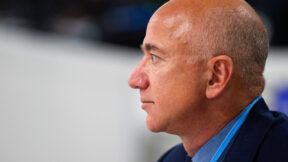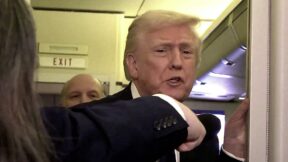CNN’s Dana Bash Presses Commerce Secretary Lutnick on Tariffs, Plummeting Imports: ‘How Is That a Good Thing?’
CNN anchor Dana Bash grilled Secretary of Commerce Howard Lutnick on the topic of tariffs, and the related spikes in prices and plummeting imports, on Sunday’s episode of State of the Union.
On April 2, President Donald Trump held a press conference in the Rose Garden to sign an executive order imposing sweeping new tariffs on virtually all imports. Multiple Republicans and some of the president’s staunchest defenders on Fox News have spoken out to criticize the tariffs as causing unnecessary economic harm. Bash’s CNN colleague Daniel Dale is among those who have fact-checked claims by the Trump administration and found them egregious enough to be deemed “lies.”
“I do want to ask about the fact that there are no ships carrying goods from China bound for the west coast right now, “said Bash. “President Trump said earlier this week that drops in imports is actually a good thing…because it shows that the imports are — that the tariffs are working, but in reality it’s going to affect people’s wallets and jobs. Truck drivers, port workers, American consumers. So my question for you is, how is that a good thing?”
Lutnick replied that Trump’s point was that “America has a $1.2 trillion trade deficit,” which was “just not balanced” and “not fair.”
Bash asked about “how people in the United States actually feel, and the immediate affect on them,” if “fixing what the president sees as a problem” means that the American people, whether they are dock workers or truck drivers or consumers are “just going to have to suffer in the short term, maybe even longer.”
Lutnick argued that wasn’t correct and said the tariffs were designed to get countries “to negotiate with us” and “bring those rates down by opening your markets to Americans who can export.”
“So what’s going to happen is we’re going to have imports. Of course, our ports — we are the consumer of the world. I mean, we consume $20 trillion worth of stuff. The world wants to sell us stuff.”
“But that is stopping now,” Bash replied. “But it’s not happening, right now, because of the president’s policies.”
“No, no, no, no, no,” Lutnick replied, arguing that the imports were “only stopping” because we were “in a negotiation with China,” but “we are optimistic that that will open.”
He insisted that Trump’s tariff policy would “open all the markets in the world that have been closed to us,” and the American companies that import and export “are going to have great businesses” because “we are the greatest economy in the world” and “everybody wants to come here.”
“As the president likes to say, everybody likes to shop here with our consumers, and it’s going to work out great,” said Lutnick.
Bash attempted again to ask about the effects on American jobs and American consumers.
“In the short term, we’re heading into the summer, and it could mean — tell me if this is wrong — that a lot of the the goods that Americans are used to either buying or, you know, getting easily will either be more expensive or hard to get,” said Bash. “We’re talking about beach chairs, swimsuits, picnic supplies, fireworks. Is this something that Americans just need to understand is going to be harder to buy?”
Lutnick insisted that U.S. and Chinese trade representatives were “meeting now,” and argued that the tariffs would mean that other countries “are going to open their markets,” and then “their tariffs are going to come down,” so “the ability for us to export and grow our economy is going to be better than ever before.”
“Of course, we’re going to have our shelves full of wonderful products made around the world,” he said, “but we’re going to make sure on their shelves that American products are finally given the fair treatment that they deserve. And I think what people forget is that we have been locked out of economy after economy after economy, and President Trump is going to break down those barriers and let us sell.”
Bash brought up his negotiation work on the UK agreement. “One other aspect is that it keeps in place a 10% across the board tariff on goods imported to the U.S. from the U.K. As you know, the cost of tariffs are paid by American consumers. We’ve been talking about this. So should Americans be prepared –”
“Well, I disagree with that, you know,” Lutnick interjected.
“Well, okay,” said Bash. “But many — most economists, I would say, disagree with you on that, and we have seen it being passed off time and time again to the American consumer.”
Lutnick said they expected the 10% UK tariff “to be in place for the foreseeable future,” but insisted that it was “silly” to say American consumers pay for the tariffs, because companies are trying to sell to them, “domestically produced products are not going to have that tariff,” and “the foreigners are going to get the tariff — have to compete, they’re going to have to compete.”
Lutnick claimed that “what happens is the businesses and the countries primarily eat the tariff,” and “this works really, really well” because “these countries and the businesses have to compete, they have to cut prices.”
Watch the clip above via CNN.
New: The Mediaite One-Sheet "Newsletter of Newsletters"
Your daily summary and analysis of what the many, many media newsletters are saying and reporting. Subscribe now!






Comments
↓ Scroll down for comments ↓